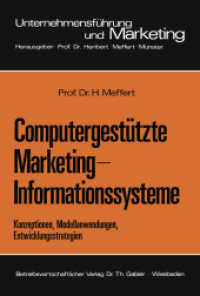- ホーム
- > 洋書
- > 英文書
- > Business / Economics
Full Description
The motivation for this book came out of a shared belief that what passed as 'theory' in operations management (OM) was all too often inadequate. In one respect, OM scholars were bending over backwards to make theories from other fields fit our research problems. In another, questionable assumptions were being used to apply mathematics to OM problems. Neither proved a good match with what the authors' had observed in practice. Successful operations were managed by considerations that were far more straightforward than much of what was being published.
The authors of this book codify these practical considerations into a set of ten fundamental principles that bring together a century of operations management thinking. The authors then apply these principles to important topics such as process design, process improvement, the supply chain, new product development, project management, environmental sustainability, and the interfaces between operations management and other business school disciplines.
Contents
1: The Discipline of Operations Management
2: The Process
3: Analyzing Processes
4: Variation, Capacity, and Throughput
5: Scale, Scope, and Complexity
6: Aligning Operations
7: Measuring Performance
8: Improving Processes
9: Coordinating Interfaces
10: The Principles of Operations Management
Appendix A: The 10 Process Principles and Subprinciples
Appendix B: Jargonbuster
Appendix C: The Cost of Inventory
Appendix D: Little's Law 204
Appendix E: Push Versus Pull Systems
Appendix E: Basic Trade-Off Models
Appendix F: The Kingman Formula
Appendix G: Capability, Control, and Six Sigma








